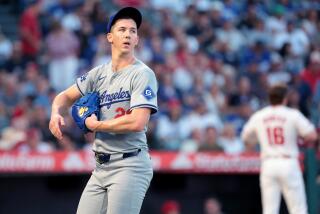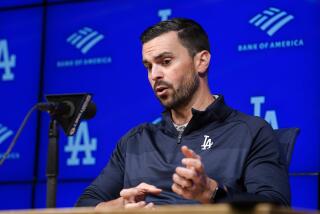An air of uncertainty around the Dodgers
Reporting From Chicago
Nervous laughs. Shaking of heads. And questions. A lot of questions.
“What do you hear?” a reporter was asked outside the visiting clubhouse at Wrigley Field on Friday.
Two days removed from learning that the commissioner’s office would oversee their day-to-day operations, the Dodgers were still waiting for answers.
General Manager Ned Colletti said a league official told him the previous night that the Dodgers would be under the same budgetary guidelines set in place by owner Frank McCourt at the start of the season. But Colletti said he didn’t know the identity of the trustee who will be appointed by Commissioner Bud Selig or when that trustee would be appointed.
Asked how much clarity he has gained over the last couple of days, Colletti said, “I don’t know. I don’t really know.”
This uncertainty appears to be a minor concern for players, who are certain they will be paid because their contracts are guaranteed.
Almost everyone else employed by the Dodgers is in a different situation.
So, these days, instead of answering questions, they are asking them.
How long will the Dodgers remain in limbo? Are they going to be sold? If they are, will people be fired? Will McCourt sue Selig? If he does, what will happen?
Several employees, who asked not to be identified because of the uncertain situation, said they are receiving information the same way as most people following the story.
“Reading the newspaper,” one said.
Unable to offer his subordinates any definitive answers, Colletti said he nonetheless felt compelled to speak to them.
“‘Focus on your job,’” Colletti said he told them. “‘You can’t worry about things out of your control.’”
Colletti said that he still reports to McCourt and that he has exchanged text messages with him to update him about roster moves and injuries. (Absent from Dodger Stadium on Wednesday and Thursday, McCourt was seen there Friday.)
Not everyone said they viewed the league’s takeover of the team as a negative development, as some wondered if there would be temporary stability in the workplace. There were fears McCourt would respond to the team’s slow start on the field and at the gate by making sweeping changes. With the league in charge, there are hopes jobs could be safe — at least until a new owner steps in.
“Maybe this will make it better,” one front-office employee said.
Under McCourt, the front office has been in flux.
In the fall of 2009, McCourt fired executive vice president Charles Steinberg, who oversaw marketing and public relations. Within months, most of the employees who were hired by Steinberg were let go.
Steinberg’s dismissal appeared to point to the elevated status of Dennis Mannion, who was promoted to president earlier in the year. But last October, the team parted ways with him too.
With Mannion out of the picture, McCourt put Geoff Wharton at the head of business operations. When Selig decided to take over the Dodgers, Wharton was already on his way out of the front office. McCourt was expecting to become increasingly involved in the team’s day-to-day operations.
The latest of McCourt’s top-level additions is vice chairman Steve Soboroff, a developer and former politician who is well-known in Los Angeles and wasted no time steadfastly defending his new boss.
More to Read
Go beyond the scoreboard
Get the latest on L.A.'s teams in the daily Sports Report newsletter.
You may occasionally receive promotional content from the Los Angeles Times.










